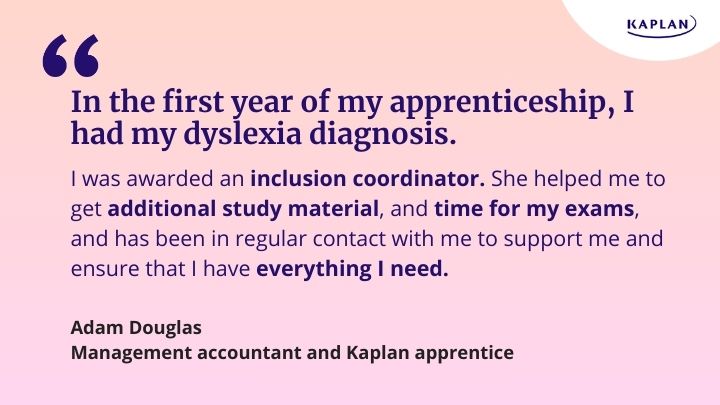Learning and developing new skills for your career can be tough. If you’re neurodivergent, it might be even harder without the right support.
You’ve probably heard about artificial intelligence (AI) and how it affects our lives. AI can also change how we learn, but it’s important to understand how this works.
Here are a few examples of how AI can help with your studies.
1. Personalised study plan
Everyone learns in their own, unique way, and personalising your learning can really help. For instance, if you have ADHD, focusing for long periods might be difficult. Reading through a study text from start to finish might not work well for you.
AI-driven platforms can help by breaking your studies into smaller pieces. You can tell your chosen AI tool how many topics you need to cover and when you plan to take your exam (or how long you want to study a subject). You can also mention topics that might take more time or any challenges you face.
Example of AI prompts for study plans:
An example of what you may send to your chosen AI tool could include:
“I can dedicate [number of hours] per week to study. I have [number of weeks/months] until my exam and have [amount of subjects] left to cover. Help me create a study plan for [course] that breaks the syllabus into management daily tasks. Include useful study strategies for someone with ADHD.”
You could also focus on challenging topics, for example:
“I also struggle more on [topic] so I might need to dedicate more time to focus on this. In the study plan, how should I distribute this time across different topics?”
AI can use the information you provide to help you create a study plan, so try to be as specific as possible. For example, not everyone with ADHD will experience the same symptoms or challenges. Therefore, if you ask AI to include strategies for someone with ADHD, it is also helpful to expand on specific challenges you experience so that the plan can be tailored to you.
Plus, you can reach out to our Academic Support team through MyKaplan for help with tough topics. They can also guide you on contacting one of our Progressional Advisors for more support with your study plan.
Whether you’re getting back into learning after a break or have just finished full-time education and kickstarted your career, a personalised learning plan can make your studies feel less daunting.
2. Time management and focus
In fields like finance and technology, where detail is important, AI tools not only help with learning but can keep you organised and on track.
Smart scheduling apps can break tasks into smaller steps and remind you of important deadlines. Some platforms even suggest the best study times when you’re most productive.
3. Real-time feedback and error correction
AI provides real-time feedback and spots areas for improvement or errors in your studying. For learners with dyslexia, this feedback helps to correct mistakes early, reducing frustration and boosting confidence.
For example, AI writing assistance can help structure reports, check for spelling and grammar mistakes, and suggest clearer ways to express ideas. This is an invaluable skill for professionals who need to communicate complex information.

4. Emotional and cognitive support
AI offers more than just academic help - it also provides emotional and cognitive support.
Neurodiverse learners may experience more anxiety when facing traditional learning challenges. AI apps can monitor stress through voice or facial recognition and suggest calming techniques when needed.
This support is especially useful if you have autism or ADHD, as managing emotions is as important as the learning material.
For those changing careers or roles, this support helps to focus on learning new skills without being overwhelmed by stress or anxiety.
5. Accessibility and inclusivity
Perhaps one of the greatest benefits of AI is the potential to make learning more inclusive.
In fields like finance, where precision and focus are key, traditional learning might inadvertently exclude neurodiverse learners. AI provides tools, feedback, and support to ensure everyone can succeed, no matter how they learn.
Adaptable tools can be the key to creating a level playing field for all learners - ensuring that everyone has the opportunity to succeed, regardless of how they process information.
Embracing neurodiversity in the workplace
Innovation thrives on diverse thinking. Using AI tools for neurodiverse learning styles supports individual success and creates a workforce enriched by different perspectives. Neurodiverse professionals bring unique skills like problem-solving, creativity, and attention to detail, which are valuable in fields like technology and finance.
Incorporating AI in learning and professional development helps companies support neurodiverse colleagues and fosters an environment where all styles of thinking can be embraced.
Final thoughts
While we encourage people from all backgrounds to enter fields like finance, using AI to support neurodiverse learners and our colleagues is crucial. It’s about creating learning spaces that help everyone to reach their potential.
By embracing AI tools, we not only improve learning but also build stronger and more innovative industries.
Further support is available
If you’re a neurodivergent learner or have any other additional learning needs, we’re here to support you on your educational journey. Our Inclusion Team is dedicated to providing personalised assistance to help you succeed.
Don’t hesitate to reach out to us for guidance and support. You can contact our team by emailing als@kaplan.co.uk or read more about how we can help.